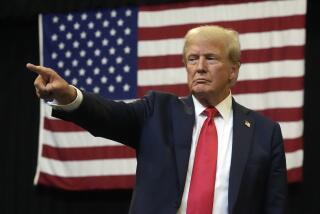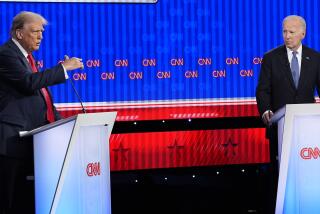Trump’s first promises since winning the election leave out the border wall, NAFTA and his Muslim ban

In President-elect Trump’s first extended remarks since the election, his only discussion of immigration involved a crackdown on visa fraud.
- Share via
Reporting from Washington — President-elect Donald Trump spent more than a year promising to build a wall, repeal Obamacare and rescind President Obama’s deportation protections for some immigrants in the U.S. illegally.
But on Monday, in his first extensive public comments since winning the election, Trump mentioned none of those issues. Nor did he talk about withdrawing from the North American Free Trade Agreement, banning Muslims from entering the country or ending the Syrian refugee program, some of his other stock campaign pledges.
Trump instead made five more modest promises for his first day in office during a nearly three-minute video. It appeared to be an effort to soften Trump’s message while he establishes an inner circle of hard-liners, including Steve Bannon, a top advisor who ran a website that has promoted white nationalist ideology.
In the video, Trump promised to withdraw from the massive Trans-Pacific Partnership trade deal, “a potential disaster for our country,” and instead pursue bilateral agreements with some of the countries involved. He also pledged to lift restrictions on energy production, including shale and coal, to implement a rule that any new government regulation must be accompanied by removing two on the books and to instruct his Joint Chiefs of Staff to develop a new cybersecurity plan.
His only discussion of immigration involved the legal kind — a crackdown on visa fraud.
“My agenda will be based on a simple core principle: putting America first,” he said. “Whether it’s producing steel-building cars or curing disease, I want the next generation of production and innovation to happen right here on our great homeland — America.”
Trump also said his previously announced ethics rules — barring those who work in his administration from lobbying for five years after they leave the government and from lobbying for foreign governments for life — would take effect as soon as he is inaugurated.
Trump vowed in the video to release more plans in the days ahead.
“These are some of our day-one executive actions,” spokesman Jason Miller said in an email. “By no means is it everything he’ll work on day one or after that — many additional good things to come.”
Trump’s first installment, though, seemed especially tailored to the voters in the former industrial belt who helped Trump win his surprise victory.
His focus on legal immigration was particularly striking and in line with the views of Alabama Republican Sen. Jeff Sessions, his pick for attorney general and one of Trump’s earliest supporters in Washington. Sessions has been a critic of the visa system, arguing that work visas, in particular, allow foreign workers to displace Americans. He has also sponsored a bill that would end the visa lottery that grants tens of thousands of green cards a year.
Trump did not discuss plans to deport millions of immigrants as he has frequently done on the trail. But the omissions were far from a declaration of a new agenda and left open the possibility that Trump may be recognizing the difficulty of achieving all of his ambitions immediately and trying to delay some of his most divisive proposals.
“There’s nothing he can really do about the wall on day one,” said Jack Pitney, a political science professor at Claremont McKenna College. “He’s probably focusing on narrow, achievable goals that won’t cause too much controversy before Thanksgiving. There will be plenty of trouble down the line.”
Trump has yet to give a post-election news conference laying out his agenda or answering questions about his transition, which gives added weight to the video. He also addressed criticisms about the disorganized nature of the transition, insisting it has gone “very smoothly, efficiently and effectively.”
The video came amid news reports that fueled more uncertainty over how Trump will avoid conflicts of interest related to his worldwide business ties, with new questions arising Monday over a conversation Trump had last week with Argentine President Mauricio Macri.
During the congratulatory call, Trump asked for help with permitting a construction project he is building in Buenos Aires, an Argentine journalist said.
Trump’s transition staff and the Argentine government both denied the project was discussed. However, Macri’s spokesman, Ivan Pavlovsky, said in a statement that the two men “briefly mentioned the personal relationship they have had for years,” alluding to their business ties, which date back to the 1980s.
Trump’s transition team did not respond to a request for a transcript or summary of the phone call and have denied that Trump’s businesses have created even a perception of potential conflict.
But Trump’s ongoing involvement in his companies raises the specter that he will use his position to further his financial interests. And the problem will not go away unless Trump puts a stronger firewall between his family and his business during his presidency, ethics specialists say.
Even if Trump does not ask for it, foreign leaders may believe they are winning influence with Trump by granting business favors to him or his children, who Trump says will control his businesses while he is president.
“Private interest currying favor and buying influence with leaders of countries by dealing with their children is a time-honored tradition in the world,” said Fred Wertheimer, president of Democracy 21, a nonpartisan group that advocates for tighter controls on conflicts of interest in government.
Wertheimer called Trump “a massive walking conflict of interest” and said questions surrounding his relationship with Macri would occur regularly unless Trump divests his business empire completely and creates a truly blind trust that does not involve his children, who are also key political advisors.
The issue dogged Trump before he was elected. Trump ran largely on an ethics platform, criticizing Hillary Clinton and her husband for enriching themselves from government service and exchanging access at the State Department for cash. Trump has also promised to “drain the swamp,” eliminating outside influence in Washington.
Trump advisor Kellyanne Conway scoffed when reporters asked on Monday how long Trump would continue conducting business during the transition.
“Do you ask people how long they will play golf and do the transition?” she said, an implicit dig at President Obama, whose rounds of golf are a frequent target of conservative criticism. “Are you suggesting he is doing something illegal? I already said he is not. But the presumption is that he is.”
Conway said Trump has consulted on ethics with lawyers, accountants and advisors. She said that his role as a businessman in transition to the highest office marks “unprecedented times.”
Special correspondent Laura Tillman in Mexico City, and Times staff writer Chris Megerian contributed to this report.
[email protected] | Twitter: @noahbierman
[email protected] | Twitter: @tracykwilkinson
ALSO
Rolling out Obamacare was chaotic, but a repeal could be much worse
Donald Trump’s first picks for top jobs show how he plans to govern from the hard right
More to Read
Get the L.A. Times Politics newsletter
Deeply reported insights into legislation, politics and policy from Sacramento, Washington and beyond. In your inbox three times per week.
You may occasionally receive promotional content from the Los Angeles Times.









